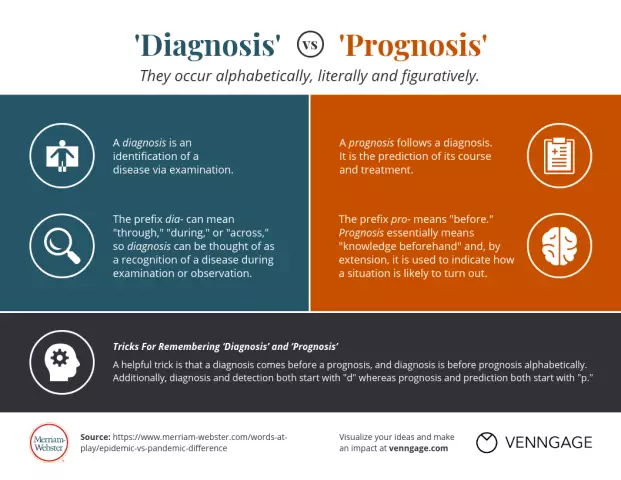- Author Rachel Wainwright [email protected].
- Public 2023-12-15 07:39.
- Last modified 2025-11-02 20:14.
Angina pectoris
General information about angina pectoris

Angina pectoris refers to a disorder of the cardiovascular system, in which the amount of blood supplied to the muscles of the heart becomes insufficient to ensure the normal functioning of this organ. Most often angina pectoris, the symptoms of which can be expressed both in the form of minor breathing problems, and severe pain in the retrosternal region, occurs due to atherosclerosis of the arteries. Signs of the disease are especially pronounced during work loads (physical exertion, brisk walking). However, situations are often observed when attacks of angina pectoris are not associated with increased stress on the heart and are explained by the predominance of vagus tone.
Among the factors influencing the onset and development of the disease, it should also be noted: hypothermia, smoking, psycho-emotional stress, stomach diseases, hiatal hernia, inflammatory changes in the coronary arteries. This means that when diagnosed with angina pectoris, treatment should be aimed not only at eliminating the main symptoms, but also at getting rid of the disease that led to the onset of attacks.
Angina pectoris - symptoms and clinical picture
The main symptom of the disease is severe pain in the chest region or in the upper part of the heart. If you do not pay attention to unpleasant symptoms, the pain gradually spreads to other parts of the body - interscapular space, shoulder, right side. As a rule, seizures appear when certain conditions coincide - brisk walking, after leaving a warm room in the cold, or physical exercise. In addition, food intake, a high position of the diaphragm and bloating can provoke an attack.
Situations when angina pectoris occurs at night are especially unpleasant. In this case, a person wakes up from sharp, sometimes unbearable pain, fear, dizziness and bouts of vomiting. Nocturnal angina pectoris, the symptoms of which sometimes appear for 30 minutes or more, is stopped with nitroglycerin. A single dose of the medication is enough to relieve severe pain and try to fall asleep again.
During seizures, patients have characteristic behavior, which is the brightest possible evidence of the nature of the disease. The person seems to freeze in place, while his face takes on a concentrated, suffering look, turns pale, becomes covered with profuse, cold sweat. There are frequent cases when angina pectoris leads to frequent urination. In addition, during attacks, the pulse slows down in patients, blood pressure rises, and signs of tachycardia are observed. In especially severe cases, the patient must be provided with emergency medical care, otherwise angina pectoris can lead to serious complications and even death of a person.
Note that it is necessary to differentiate pain in angina pectoris from pain in neurosis. The latter are longer, aching and are localized not behind the sternum, but in the heart region. However, they, as a rule, are not associated with walking or other physical activity.
As for the features of the development of the disease. It almost always has a chronic course. Attacks may disappear for several months or years, but then they reappear, and more often and more strongly. For this reason, when diagnosed with angina pectoris, treatment should be started as early as possible. Otherwise, patients develop myocardial infarction and other pathological changes in the cardiovascular system, including cardiosclerosis, cardiac arrhythmias, symptoms of heart failure.
Angina pectoris - treatment and prevention of the disease
A few words about what to do during an attack. The patient should stop any physical activity, take a calm, relaxed posture, take care of a constant flow of heat to the arms and legs (heating pads are used for this). At the first sign of an attack, you should take some vasodilator - nitroglycerin or validol. The latter is weaker and less reliable. If a patient has angina pectoris, the symptoms of which appear in the form of severe pain, his condition can be alleviated with the help of mustard plasters and leeches on the heart.

In the event that vasodilators do not lead to the expected result, the patient is administered promedol, morphine or omnopon. Effective for severe pain and inhalation of a mixture of nitrous oxide with air. Indirect anticoagulants, such as neodikumarin, are especially good for stubborn seizures, but should only be used under medical supervision. Self-activity in this case is absolutely unacceptable, since the drugs are potent and have many side effects.
Of great importance in the treatment of angina pectoris is also non-medicinal methods - therapeutic exercises, walks, trips to specialized sanatoriums, physiotherapy procedures. The patient should give up smoking and alcohol, lead a healthy lifestyle, take care of good sleep, rational alternation of work and rest.
Prevention of the disease is reduced to the fight against atherosclerosis and hypertension, good nutrition, adequate sleep and giving up bad habits.
YouTube video related to the article:
The information is generalized and provided for informational purposes only. At the first sign of illness, see your doctor. Self-medication is hazardous to health!






